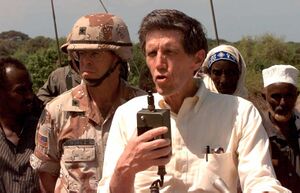Difference between revisions of "Robert Oakley"
(add image) |
(Unocal) |
||
| Line 13: | Line 13: | ||
|death_place=McLean, Virginia, United States | |death_place=McLean, Virginia, United States | ||
|political_parties=Republican | |political_parties=Republican | ||
| − | |||
|historycommons=http://www.historycommons.org/entity.jsp?entity=robert_oakley_1 | |historycommons=http://www.historycommons.org/entity.jsp?entity=robert_oakley_1 | ||
|employment={{job | |employment={{job | ||
| Line 34: | Line 33: | ||
}} | }} | ||
}} | }} | ||
| + | '''Robert Oakley''', the former US ambassador to Pakistan, was a "counter-terrorism” specialist for the [[Reagan administration]] who armed and trained the [[mujahadeen]] during the war against the [[Soviets]] in the [[1980s]]. He was an [[Iran-Contra]] conspirator charged by Independent Counsel [[Lawrence Walsh]] as a key figure involved in arms shipments to [[Iran]].<ref name=chin>https://www.globalresearch.ca/what-spearheaded-20-years-of-war-and-atrocities-unocal-and-the-coveted-trans-afghan-pipeline-route/5753722</ref> | ||
| + | |||
| + | ==Unocal== | ||
| + | Oakley was an envoy for [[Unocal]], an oil company that wanted to build a pipeline across [[Afghanistan]]. A trans-Afghanistan pipeline was not simply a business matter, but a key component of a broader geostrategic agenda: total military and economic control of [[Eurasia]]. In the 1990s, Unocal negotiated with the [[Taliban]] for access, but the negotiations stalled.<ref name=chin/> | ||
| + | |||
| + | ==Drugs== | ||
| + | Oakley, US ambassador to Pakistan between 1988 and 1991, complained that the [[CIA/Pakistan station|local CIA station]] was working hand in glove with [[mujahedin|Afghan mujahideen]] leaders who were heavily involved in the [[narcotics trade]], even after the withdrawal of Soviet troops: | ||
| + | |||
| + | {{QB|I kept asking the Station to obtain information on this traffic from its sources inside [[Afghanistan]]. They denied that they had any sources capable of doing so. They could not deny that they had sources, since we were getting information on weapons and other matters. I even raised the matter with [CIA chief] [[Bill Webster]]. Never got a satisfactory answer. Nothing ever happened.<ref>https://jacobin.com/2021/11/what-we-really-know-about-the-cia-and-crack</ref>}} | ||
| + | |||
| + | |||
{{SMWDocs}} | {{SMWDocs}} | ||
==References== | ==References== | ||
{{reflist}} | {{reflist}} | ||
{{Stub}} | {{Stub}} | ||
Latest revision as of 01:29, 21 January 2024
(diplomat) | ||||||||||||||
|---|---|---|---|---|---|---|---|---|---|---|---|---|---|---|
 Robert Oakley in Somalia in 1993 | ||||||||||||||
| Born | Robert Bigger Oakley March 12, 1931 Dallas, Texas, United States | |||||||||||||
| Died | December 10, 2014 (Age 83) McLean, Virginia, United States | |||||||||||||
| Alma mater | South Kent School, Princeton University | |||||||||||||
| Spouse | Phyllis E. Oakley | |||||||||||||
| Party | Republican | |||||||||||||
| ||||||||||||||
Robert Oakley, the former US ambassador to Pakistan, was a "counter-terrorism” specialist for the Reagan administration who armed and trained the mujahadeen during the war against the Soviets in the 1980s. He was an Iran-Contra conspirator charged by Independent Counsel Lawrence Walsh as a key figure involved in arms shipments to Iran.[1]
Unocal
Oakley was an envoy for Unocal, an oil company that wanted to build a pipeline across Afghanistan. A trans-Afghanistan pipeline was not simply a business matter, but a key component of a broader geostrategic agenda: total military and economic control of Eurasia. In the 1990s, Unocal negotiated with the Taliban for access, but the negotiations stalled.[1]
Drugs
Oakley, US ambassador to Pakistan between 1988 and 1991, complained that the local CIA station was working hand in glove with Afghan mujahideen leaders who were heavily involved in the narcotics trade, even after the withdrawal of Soviet troops:
I kept asking the Station to obtain information on this traffic from its sources inside Afghanistan. They denied that they had any sources capable of doing so. They could not deny that they had sources, since we were getting information on weapons and other matters. I even raised the matter with [CIA chief] Bill Webster. Never got a satisfactory answer. Nothing ever happened.[2]